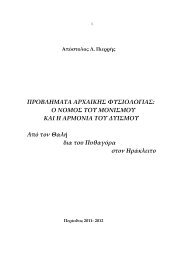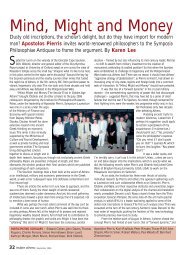chapter 10 the monism of darkness and the dualism of limit and ...
chapter 10 the monism of darkness and the dualism of limit and ...
chapter 10 the monism of darkness and the dualism of limit and ...
You also want an ePaper? Increase the reach of your titles
YUMPU automatically turns print PDFs into web optimized ePapers that Google loves.
MONISM OF DARKNESS - DUALISM OF LIMIT AND INDETERMINACY 99<br />
ancient Darkness beyond any beginning <strong>and</strong> any ordering,<br />
unspeakable, lawless, law-imposing Night.<br />
NOTES<br />
1. V. (i) Chapter 12, infra; (ii) A.L. Pierris, First Principles <strong>and</strong> <strong>the</strong> Beginning<br />
<strong>of</strong> World-Formation in Stoicism in K. Boudouris (ed.) Hellenistic<br />
Philosophy, vol. II, 1994, pp. 149-176 [First Principles]; (iii) Id. Hellenistic<br />
Philosophy: Continuity <strong>and</strong> Reaction in an Oecumenical Age in K.<br />
Boudouris (ed.) Hellenistic Philosophy vol. I, 1993, pp. 133-135<br />
(especially Excursus I: On <strong>the</strong> Hybris <strong>of</strong> Limitation <strong>and</strong> Order <strong>and</strong><br />
Excursus II: Immanence, Dualism <strong>and</strong> Theodicy.<br />
2. For an analysis <strong>of</strong> related procedures see <strong>the</strong> articles cited in <strong>the</strong> previous<br />
note.<br />
3. Cf. O. Kaiser, Die Mythische Bedeutung des Meeres in Aegypten, Ugarit<br />
und Israel, 1962, pp. 116, 169.<br />
4. The idea that <strong>the</strong> primary impetus towards world-formation is due to Eros<br />
(who is identical with, or conceived by, <strong>the</strong> Demiurge) has deep religious<br />
roots <strong>and</strong> a long philosophical history <strong>and</strong> articulation. Pherecydes 7 B 3<br />
DK: Âå˜ òEÚˆÙ· ÌÂÙ·‚‚ÏÉÛı·È ÙeÓ ¢›· ̤ÏÏÔÓÙ· ‰ËÌÈÔ˘ÚÁÂÖÓ, ¬ÙÈ ‰c<br />
ÙeÓ KfiÛÌÔÓ âÎ ÙáÓ âÓ·ÓÙ›ˆÓ Û˘ÓÈÛÙa˜ Âå˜ ïÌÔÏÔÁ›·Ó ηd ÊÈÏ›·Ó õÁ·ÁÂ<br />
ηd Ù·˘ÙfiÙËÙ· appleÄÛÈÓ âÓ¤ÛappleÂÈÚ ηd ≤ÓˆÛÈÓ ÙcÓ ‰È’ ¬ÏˆÓ ‰È‹ÎÔ˘Û·Ó. Cf.<br />
infra, Chapter 12, p. 175 <strong>and</strong> nn. 55-56. In <strong>the</strong> eleborate <strong>and</strong> brilliant<br />
cosmogonic myth that Dion Chrysostomus narrates (Oratio XXX, 55), <strong>the</strong><br />
first principle, primary beginning <strong>and</strong> sole eternal God <strong>and</strong> endless Being:<br />
¬Ù οÏÏÈÛÙÔ˜ Á›ÁÓÂÙ·È ... Âéıf˜ âapplefiıËÛ ÙeÓ âÍ àگɘ ‚›ÔÓ, öÚˆÙ· ‰b<br />
Ï·‚ÒÓ ... œÚÌËÛÂÓ âappled Ùe ÁÂÓÓÄÓ Î·d ‰È·Ó¤ÌÂÈÓ ≤ηÛÙ· ηd ‰ËÌÈÔ˘ÚÁÂÖÓ<br />
ÙeÓ ùÓÙ· ÓÜÓ KfiÛÌÔÓ ... àÛÙÚ¿„·˜ ‰b ¬ÏÔ˜ ÔéÎ ôÙ·ÎÙÔÓ Ôé‰b Ú˘apple·ÚaÓ<br />
àÛÙÚ·apple‹Ó ... àÏÏa ηı·ÚaÓ Î·d àÌÈÁÉ apple·ÓÙe˜ ÛÎÔÙÂÈÓÔÜ (~ º¿Ó˘)<br />
ÌÂÙ¤‚·Ï ڷ‰›ˆ˜ ±Ì· ÙFÉ ÓÔ‹ÛÂÈ. ÌÓËÛıÂd˜ ‰b \AÊÚÔ‰›Ù˘ etc. In<br />
Parmenides <strong>the</strong> creator is Aphrodite, 28 B 12. 4-6 DK:<br />
âÓ ‰b Ì¤Ûˇˆ ÙÔ‡ÙˆÓ ¢·›ÌˆÓ m apple¿ÓÙ· ΢‚ÂÚÓ÷ÄØ<br />
apple¿ÓÙ· ÁaÚ < m> ÛÙ˘ÁÂÚÔÖÔ ÙfiÎÔ˘ ηd Ì›ÍÈÔ˜ ôÚ¯ÂÈ<br />
apple¤ÌappleÔ˘Û’ ôÚÛÂÓÈ ıÉÏ˘ ÌÈÁÉÓ Ùfi Ù’ âÓ·ÓÙ›ÔÓ<br />
·sÙȘ ôÚÛÂÓ ıËÏ˘Ù¤Úˇˆ<br />
with Eros as her first <strong>of</strong>fspring (B 13):<br />
appleÚÒÙÈÛÙÔÓ ÌbÓ òEÚˆÙ· ıÂáÓ ÌËÙ›Û·ÙÔ apple¿ÓÙˆÓ.










